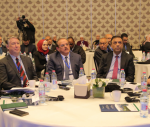You are here
Kingdom in 'dire need' for better access to legal aid institutions — report
By Ana V. Ibáñez Prieto - Apr 04,2018 - Last updated at Apr 04,2018
AMMAN — Jordan is in dire need of raising awareness on the legal rights and duties of its citizens while increasing their access to legal aid institutions, a recent report issued by The Hague Institute for Innovation of Law said.
Based on a survey of 6,000 citizens from several governorates, the study determined that most Jordanians feel “competent and confident” in solving their legal issues, while more than half of the legal problems faced by citizens remain unsolved.
Sixty per cent of the respondents reported having asked for legal information and assistance from either official or unofficial sources, while only 11 per cent preferred turning to a lawyer. Meanwhile, 24 per cent expressed that "the most useful sources for legal information are family members”.
However, most respondents showed a “relatively high” level of confidence in official institutions, with security agencies enjoying the highest level of trust.
On the legal situation of refugees, the report showed that most Syrian refugees in Jordan face legal issues related to “basic human needs” and attempt to take legal action, but their cases remain unsolved due to “weakness” in available resources.
Family and personal status matters appeared to be the most common legal issue among youth and vulnerable women according to the study, which stressed that “divorce issues impacted women three times more than men while 40 per cent of female respondents reported a family problem”.
The study called for “further innovation in justice and investments aimed at building a sustainable judicial system”, in addition to the development of “standardised protocols for justice solutions”.
A recent report by the Arab Renaissance for Democracy and Development (ARDD) legal aid organisation had also identified a “significant lack of legal services for women in Sharia [Islamic Law] courts”.
“The government, alongside key institutions, has undoubtedly made remarkable achievements in responding to a wide array of challenges within the justice sector with recent developments and achievements,” the study noted, highlighting that “the Personal Status Law based on Sharia interpretation is detailed and fairly comprehensive”.
“Yet, while Jordan has made progress in promoting women’s access to justice, the lack of an enabling environment, limited supply of legal and institutional resources, and high demand of mechanisms still represent significant challenges,” the report continued.
The ARDD pointed out that “facilitating an enabling environment is critical to enhance women’s access to justice”, calling on decision makers to “adopt and revise national legal frameworks and harmonise them with international human rights standards — including granting women full citizenship rights”.
The Jordanian National Commision for Women (JNCW) recently criticised the lack of female Sharia judges in Jordan, stressing the importance of "engaging women in such positions as Sharia courts often deal with family issues in which women find themselves in a weaker position”.
“The law allows the engagement of women in this profession, but we have not been able to see this come into practice in Jordan,” JNCW Secretary General Salma Nims told The Jordan Times, citing the presence of female Sharia judges in neighbouring countries as an example to be followed.
Related Articles
TEHRAN, Iran — Iran has "no need to join" global agreements on areas such as terrorism and money laundering, the country's supreme leader Ay
AMMAN — The Arab Renaissance for Democracy and Development (ARDD) on Thursday issued a report analysing the status of women’s access to just
AMMAN — A local study has called on the international community to continue to shoulder its legal and moral responsibilities in supporting J
















